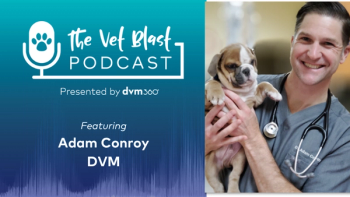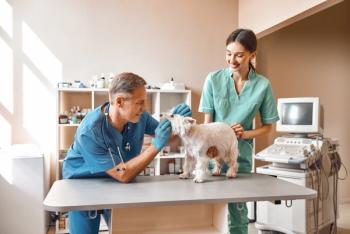
Please pass the pus!
Sometimes, as the saying goes, "'tis better to be silent and be thought a fool, than to speak and remove all doubt." Remember this when you feel the need to discuss rectal diseases with your colleagues-in a crowded public place.
It was a warm fall day as I crowded onto the shuttle bus from the airport to downtown for a veterinary conference. Most of the passengers were veterinarians, but not all, including the young man squeezed into the too small seat next to me. He loosened his tie, scrunched himself smaller, and politely began reading a thin work report.
After the bus—which was lacking in the air conditioning department—filled up, we merged onto the expressway for the half-hour journey. All was quiet as I gazed at the landscape. Then a voice rang out from the back of the bus.
"Well, perineal hernias aren't hard to diagnose. Stick your finger up his anus and compare sides. You can wiggle it around and feel the pocket, unless it's full of ..." For 10 minutes, this doctor described the joys of rectal diseases in quite graphic detail—at a volume that would compete with a rock concert. Surely any casual listener would have been able to pass a surgery class mid-term by the time the lecture was finished. But it wasn't finished. We moved through a recap of anal sacs and their various problems and a smattering of tips on cats with urinary problems. "Well, hang onto his penis and ..."
My seatmate swallowed nervously, further loosening his tie and reading more intently, trying to block out the conversation. Ahead of us a woman in a business suit carrying a leather briefcase glanced around uncomfortably and began assiduously consulting her day planner.
Soon the colorectal crowd became silent, probably drawing pictures, as the bus slowed for the afternoon traffic, making the air conditioner's epic struggle all the more futile. I could sense the relaxation in my seatmate as silence ensued for a while, until ahead of us two rows, a dedicated doctor thought it might be a good time to check on her patients—from a thousand miles away.
"Yeah, good. Any more vomiting? Blood or just bile? Greenish? Hmm, that's odd. Any more of that slimy diarrhea? Did you get all that out of his fur yet?"
By now you could tell who the nonveterinarians were. They were the ones squirming in their seats. Fortunately, the multiple conversations on the crowded bus soon became a cacophony, with the colorectal chorus now discussing pull-through rectal surgeries and the blood-soaked cats drowning out the vomiting and diarrheic dogs, so that the involuntary subjects of our professional discourse probably couldn't make sense of it. Blessed sensory overload.
They did seem in a hurry to get off the bus. Probably the lack of air conditioning.
Not everyone loves fright night
Now, I believe that a spirited and open discussion of what we do is essential to the progress of the profession. I, for one, am a big fan of anal sacs, and nothing pleases me more than to see two of them on the surgery schedule. But we must make room for those who don't share our comfort with and excitement about open pyometras and all that oozes. Sometimes for us, especially in public, silence is golden.
Luckily, the bus ride back to the airport after the conference was blessedly quiet. The airline bumped us up to first class, where my wife and I were surrounded by a group of interventional cardiologists. I know this because I glanced at a program one of them was silently consulting. Now, these doctors wear face masks at work so all the blood spraying around won't get in their eyes. And for the next two hours, quietly and with concern for their surrounding passengers, they conversed with each other.
They talked about golf.
Craig Woloshyn, DVM
Dr. Craig Woloshyn, a Veterinary Economics Editorial Advisory Board member, owns Animal Medical Clinic in Spring Hill, Fla., and Sun Dog Veterinary Consulting. Please send questions or comments to
Newsletter
From exam room tips to practice management insights, get trusted veterinary news delivered straight to your inbox—subscribe to dvm360.




